Friends with the Best American Girl
It’s beyond frustrating growing up with your femininity being questioned, children relentlessly teasing about my hair and amazed by how I was unsure of playground games. It was isolating, I saw girls being praised and wondered why it couldn’t be me. I befriended the most extraordinary girl, Elise, it felt reassuring that someone had viewed me of value that happened to be white. Time passed and I was in Elise’s car with our other friends, filled with bass boosted club music and laughs – it’s interrupted by Kylie, a Korean American,
“Oh God, I think the reason why I wanted to be liked by the white girls in my dance class was because I wanted to be them.” The car goes silent with quiet giggles erupting, I look over to Elise and a realization hits me.
Throughout our friendship, I admired Elise, I was obsessed with her smile and gorgeous round eyes. I questioned if I had a crush on her, but my admiration of her wasn’t on par with a realization of sexuality. So dearly, I wanted to be her other half – that I am just as beautiful and like her. People staring, impeccable fashion, taste that was highly regarded and no question of her femininity – she is the picture of girlhood and innocence that was enviable. I couldn’t relate to other girls, games of patty cake and mash weren’t games I had grown up with, the clothes my mother chose for me were laughable and my long hair were a reason to pull. No matter how hard I tried to assimilate, it felt out of reach. I could be in the same neighborhood, same interest in toys, same socioeconomic status and was continuously alienable. Elise was what I desired, she was all of that and our friendship was the closest way I could configure my image to be seen as a properly feminine girl. Even in our later years, she was my inspiration for makeup and I would contour my face to attempt like hers, acceptable youth beauty that is seen as desirable and unalienable. Despite her being my tether in Eurocentric excellence, she is still my greatest connection to femininity and intrapersonal connections of a white patriarchal world.
